Shop At Haya: Your Ultimate Shopping Guide
Discover the best shopping tips, trends, and deals for a smarter buying experience.
Cozy Up: How Insulation Can Turn Your Home into a Snug Retreat
Transform your home into a cozy retreat! Discover how insulation can keep you snug and save you money. Unlock the secrets now!
The Science Behind Insulation: How It Keeps Your Home Cozy
Insulation plays a crucial role in maintaining a comfortable temperature within your home, acting as a barrier against heat flow. R-values, which measure the effectiveness of insulation, determine how well the material resists heat transfer. The higher the R-value, the better the insulation at keeping the cold air in during summer and the warm air in during winter. This is not just about comfort; it also significantly impacts your energy bills. By properly insulating your home, you can reduce the need for heating and cooling systems to work overtime, leading to lower energy consumption and costs.
The science behind insulation involves understanding thermal dynamics. Heat naturally flows from warmer areas to cooler ones, which is where insulation comes in. Various materials, such as fiberglass, foam, and cellulose, have different properties that contribute to their effectiveness. For instance, fiberglass insulation contains tiny air pockets that trap heat, making it a popular choice among homeowners. Additionally, the placement of insulation is vital; it should be installed in areas like the attic, walls, and floors to maximize its insulating effect. Overall, good insulation choices not only keep your home cozy but also enhance its overall energy efficiency.

Top 5 Insulation Materials for a Snug Home Retreat
Creating a cozy and energy-efficient home retreat starts with choosing the right insulation materials. Here are the top 5 options that can transform any space into a snug haven:
- Fiberglass Insulation: This popular choice is made from fine glass fibers and is known for its excellent thermal resistance. It can effectively reduce energy costs while providing soundproofing benefits.
- Foam Board Insulation: Ideal for basements and exterior walls, foam board insulation offers high insulating values and is moisture-resistant, making it a sturdy option for your home retreat.
- Spray Foam Insulation: With its superior air sealing properties, spray foam insulation can fill in gaps and crevices, providing an airtight barrier that enhances energy efficiency.
- Cellulose Insulation: Made from recycled paper products, cellulose is an eco-friendly option that provides effective thermal resistance and sound reduction, contributing to a greener home.
- Rock Wool (Mineral Wool) Insulation: Known for its fire-resistant properties, rock wool insulation is also highly effective at reducing noise and maintaining temperature, making it an excellent choice for comfortable living spaces.
Is Your Home Losing Heat? Signs You Need Better Insulation
As winter approaches, many homeowners may start to notice signs that their home is losing heat. One of the most obvious indicators is an increase in energy bills. If you find yourself cranking up the thermostat and still feeling cold, it may be time to evaluate your home's insulation. Additionally, check for drafts around windows and doors, as well as in attics and basements. A sudden drop in indoor temperature, especially in rooms that are typically warm, can also signify inadequate insulation.
Other signs that you may need better insulation include uncomfortable temperature fluctuations throughout your home and excessive condensation on windows during the colder months. In extreme cases, mold or mildew can appear in poorly insulated areas due to lingering cool, damp air. If you're experiencing any of these issues, it might be wise to consult with a professional to assess your insulation needs and keep your home comfortable and energy-efficient this winter.